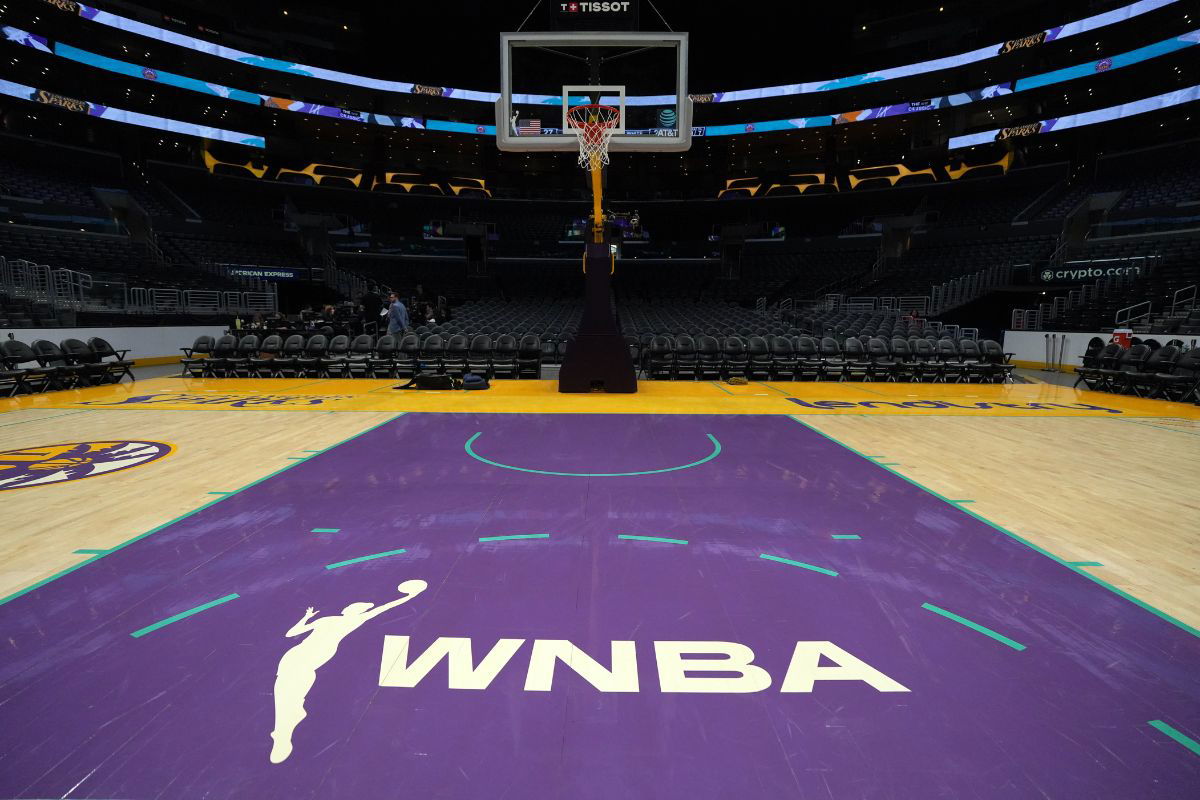
Imago
Jul 9, 2024; Los Angeles, California, USA; The WNBA logo on the court at Crypto.com Arena. Mandatory Credit: Kirby Lee-Imagn Images

Imago
Jul 9, 2024; Los Angeles, California, USA; The WNBA logo on the court at Crypto.com Arena. Mandatory Credit: Kirby Lee-Imagn Images
The 2024 WNBA season approaches its end as the top two seeded teams, New York Liberty and Minnesota Lynx, have pushed the WNBA Final series for the decisive Game 5. Whoever wins the history is sure to be made as either Liberty will claim their first title or the Lynx will become the first team to have won the coveted championship five times.
Watch What’s Trending Now!
With one final game remaining, another intriguing aspect of this intense Finals matchup is the championship prize money that awaits the winners. So, how much will the champions and the runners-up actually take home?
ADVERTISEMENT
WNBA Playoffs Prize Money: Understanding the Merit-based Distributed Payout Structure
Under the current Collective Bargaining Agreement (CBA), the WNBA prize money is structured so that every team making it to the playoffs earns a payout, with the amount depending on how far they advance in the competition. The total prize pool for the WNBA playoffs stands at $500,000. However, of course, the largest share is reserved for the team that ultimately secures the championship title.
Each player on the championship-winning team receives $20,825, which means the team collectively takes home $249,900, assuming the standard 12-player roster. This amount is notably higher than what the runners-up will claim, with each player on the losing team earning $7,746, totaling $92,952 for the entire squad—less than half of what the champions will walk away with.
Top Stories
Forced to Leave FOX, Cowboys Legend Troy Aikman Says ESPN Is Like ‘U.S. Government’ & Clearly Distinguishes the Two Networks

Caitlin Clark, JuJu Watkins Announce Injury Update After Months of Battle

Lakers’ Gabe Vincent Dishes on LeBron James, Luka Doncic’s Sacrifices, Role on the Team and More (Exclusive)

Who Is Paige Shiver? All About Michigan Football Staffer & Daughter of Veteran Bears Scout Jeff Shiver

Arrest For Shaquille O’Neal’s Stolen Range Rover Made But More Bad News Awaits

$250M Michigan Booster Reveals More to Sherrone Moore Saga After Paige Shiver Confirms Police Visit


USA Today via Reuters
Oct 18, 2023; Brooklyn, New York, USA; Las Vegas Aces forward A’ja Wilson (22) celebrates after winning thhe 2023 WNBA Finals at Barclays Center. Mandatory Credit: Wendell Cruz-USA TODAY Sports
Teams that were eliminated in earlier rounds also receive consolation prizes. Players from the teams that reached the semifinals but didn’t advance will each take home $3,123. Meanwhile, those knocked out in the first round will receive $1,616 per player on their roster.
ADVERTISEMENT
While this prize money is already significantly lower than what the NBA offers its champions—where the 2023 winners took home nearly $25 million—the WNBA’s championship payout is even smaller compared to other tournaments held during the league’s regular season.
ADVERTISEMENT
The WNBA Championship Prize is less than 24-year younger tournament: Commissioner’s Cup
As the Minnesota Lynx compete in the 2024 WNBA Finals, a victory would add to the substantial rewards they’ve already secured, including the significant prize from winning the WNBA Commissioner’s Cup during the regular season. Despite being introduced only three years ago—24 years after the WNBA began—the Commissioner’s Cup actually awards a larger cash prize to its champions than the Finals, making a potential Lynx win even more lucrative.

USA Today via Reuters
Jun 25, 2024; Belmont Park, New York, USA; The Minnesota Lynx celebrate after defeating the New York Liberty 94-89 to win the WNBA Commissioner’s Cup Championship at UBS Arena. Mandatory Credit: Wendell Cruz-USA TODAY Sports
The reason for this difference lies in how the prize money is divided. During the WNBA playoffs, the total prize pool is split among multiple teams, which means each player receives a smaller share. However, in the case of the Commissioner’s Cup, the $500,000 prize—equivalent to the total amount allocated for the entire WNBA playoffs—is awarded solely to the players of the winning team, without being shared with any other. As per The Sporting News, with a full roster of 12 players, that amounts to roughly $41,700 per player in the Commissioners Cup.
ADVERTISEMENT
Last year, the Liberty found themselves in a position much like the Lynx are now. After securing the Commissioner’s Cup, they had their sights set on the WNBA Championship, but it ended in disappointment, with only the $500,000 from the Cup to show for their efforts. Now, the suspense builds as we wait to see if the Liberty can finally achieve their championship dream or if the Lynx will walk away with a combined total of $749,900 from winning both the Commissioner’s Cup and the WNBA title this season.
ADVERTISEMENT
ADVERTISEMENT
ADVERTISEMENT

